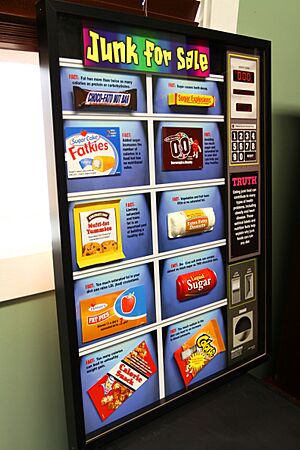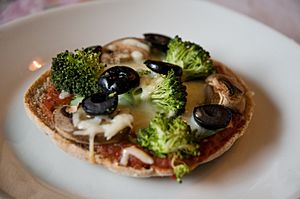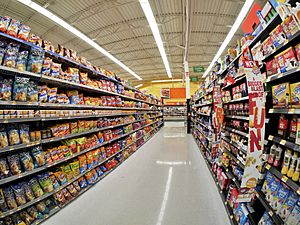Junk food facts for kids

Junk food is a common name for foods that have lots of calories from sugar or fat. These foods often have very little dietary fiber, protein, vitamins, minerals, or other important nutrients. You might also hear it called HFSS food, which means it's high in fat, salt, and sugar. The term "junk food" has been around since the 1950s.
What exactly counts as junk food can change over time. Some foods high in protein, like meat cooked with lots of saturated fat, might be seen as junk food. Fast food is often thought of as junk food, but not all fast food is unhealthy. Most junk food is also processed food, meaning it has been changed from its natural state.
People are worried about the health problems that come from eating too much junk food, especially obesity (being very overweight). This has led to public health campaigns to teach people about healthy eating. Some countries have even put limits on how junk food can be advertised or sold. Eating too much junk food can also cause sadness, stomach problems, heart disease, stroke, type 2 diabetes, and even some types of cancer.
Contents
What is Junk Food?
In simple terms, junk food usually means commercial products like candy, baked goods, ice cream, salty snacks, and soft drinks. These foods offer very little nutritional value but are full of calories, salt, and fats. While some fast foods are junk foods, others, like salads, can be healthy.
Junk food provides "empty calories". This means it gives your body energy but not the protein, vitamins, or minerals you need to stay healthy. Some foods, like hamburgers, pizza, and tacos, can be either healthy or junk food. It all depends on what ingredients are used and how they are made. Foods that are highly processed often fall into the junk food group. This includes breakfast cereals that are mostly sugar or high fructose corn syrup and white flour.
In the United Kingdom, they use a special scoring system to decide if a food is "high in fat, salt, and sugar" (HFSS). Foods get points for things like energy, saturated fat, sugar, and salt. They also get points for good things like fruit, vegetables, fiber, and protein. The difference in these scores tells them if a food is considered junk food.
Some experts believe that calling a food "junk" isn't very helpful. They say that all food has some value, and there are no "bad foods" unless they are spoiled. Instead, they say there are "bad diets," which means eating the wrong mix or amount of foods.
How Did the Term "Junk Food" Start?
The phrase "junk food" was first used in the early 1950s. However, some people say Michael F. Jacobson of the Center for Science in the Public Interest made it popular in 1972. In 1952, a newspaper headline used the phrase "Junk Foods' Cause Serious Malnutrition." This article was a reprint from 1948, originally titled "Dr. Brady’s Health Column: More Junk Than Food."
In that article, Dr. Brady called these foods "cheat food." He said they were anything made mostly of white flour or refined white sugar or syrup. Examples he gave included white bread, crackers, cake, candy, ice cream soda, chocolate malted, sundaes, and sweetened carbonated beverages. The term "cheat food" was used in newspapers as early as 1916.
Why is Junk Food So Popular?
Junk food is very popular and a big part of modern culture. In the US, people spend billions of dollars on fast food each year. This is a huge amount, even compared to supermarket sales, which also include many types of junk food like snacks and candy.
In 1976, a popular song called "Junk Food Junkie" described someone who pretended to eat healthy during the day but secretly ate lots of Hostess Twinkies, Fritos corn chips, McDonald's and KFC at night. Years later, Time magazine called the Twinkie one of the "Top 10 Iconic Junk Foods." They said it was famous for having no nutritional value but was still a cultural favorite.
America even has a National Junk Food Day on July 21st! Many of these food holidays are created by companies that want to sell more food. News headlines often celebrate this day with fun articles about different junk food combinations or celebrity favorites.
Scientists aren't completely sure why junk food is so appealing. It's likely a mix of how our bodies react and how our minds work. Food companies spend huge amounts of money to create flavors that make us want more sugar, salt, and fat. Eating these foods can make our brains feel good, which might make them seem addictive. Also, huge marketing campaigns create strong brand loyalty, which can sometimes be more important than how the food tastes.
It's also known that people with less money tend to eat more junk food. The reasons for this are not fully clear. Some studies suggest that when people are worried about having enough money for their next meal, they might choose the quick satisfaction of junk food instead of investing in healthier, but sometimes more expensive, options.
How Does Junk Food Affect Your Health?
When you eat junk food very often, the extra fat, simple sugars, and processed ingredients can increase your risk of obesity. It can also lead to cardiovascular disease (heart and blood vessel problems) and many other long-term health issues. One study in Ghana found a clear link between eating junk food and higher rates of obesity and heart attacks. Studies show that arteries can start to get clogged as early as age 30, setting the stage for future heart problems. People also tend to eat too much junk food in one sitting. When they fill up on junk food, they are less likely to eat healthy foods like fruit or vegetables.
Studies on rats have shown negative effects of junk food that might also happen in people. A 2008 study found that eating junk food changed rat brains in a way similar to how some addictive substances affect the brain. After eating unlimited junk food for weeks, the rats needed more and more food to feel pleasure. When the junk food was taken away and replaced with a healthy diet, the rats refused to eat the healthy food for two weeks, even though they were starving. Another study in 2007 found that female rats who ate junk food during pregnancy had babies who were more likely to develop unhealthy eating habits.
Other research suggests that sugary foods can negatively affect your energy levels and how you feel emotionally.
A study looked at 4,000 children. When they were four and a half years old, their mothers reported how often they ate 57 different foods and drinks. At age seven, the children were checked for things like hyperactivity. The study found that children who ate more junk food at age seven were more likely to be very hyperactive. There wasn't a strong link between junk food and other issues like conduct problems or emotional symptoms.
What is Being Done About Junk Food?
Many countries are thinking about or have already put in place laws to reduce how much junk food people eat. In 2014, a United Nations expert said that governments should:
- Create guidelines for healthy eating.
- Control how junk food is advertised.
- Make food labels easy for consumers to understand.
- Set up ways to hold people accountable for not protecting the right to health.
An early effort in the US was by the McGovern Committee from 1968 to 1977. This group looked into hunger and nutrition. They became concerned about the use of salt, sugar, and fat in processed foods. They also noticed that many TV ads were for junk food. The committee said that bad eating habits could be as dangerous as smoking. Their findings were criticized by many, including the food industry. However, their work led to the "Dietary Goals for the United States" in 1977, which later became the "Dietary Guidelines for Americans" published every five years.
Taxes on Junk Food
Some governments have added special taxes, called sin taxes, to junk food to make it more expensive and encourage people to buy less.
- Denmark tried a "fat tax" in 2011 on foods with more than 2.3% saturated fat, but it only lasted about a year.
- Hungary taxes foods and drinks high in added sugar, fat, and salt.
- Norway taxes refined sugar.
- Mexico has taxes on unhealthy food.
- In 2015, the Navajo Nation in the US put a 2% tax on junk food to help with obesity and diabetes among their people.
Limiting Advertising to Children
Advertising junk food to children is a big concern. The American Psychological Association found that more advertising for unhealthy foods is linked to higher rates of childhood obesity. The World Health Organization (WHO) suggests that governments should limit how much food marketing children see. They say that many ads promote foods high in fats, sugar, and salt, which should be limited in a healthy diet. Food marketing can influence what children want to eat and what they buy. It's also linked to a higher risk of children being overweight or obese. The eating habits children learn early can last into adulthood, leading to more health problems.
In the UK, there are ongoing efforts to limit or stop ads for high-sugar, salt, or fat foods when children might be watching. A UK parliamentary committee suggested many ideas:
- Ban cartoon characters from advertising unhealthy food to children.
- Make supermarkets remove unhealthy snacks from checkout areas.
- Allow local areas to limit the number of fast food places.
- Ban brands linked to unhealthy foods from sponsoring sports teams or events.
- Make social media like Facebook reduce junk food advertising to children.
These are currently just suggestions.
In Australia, a 2015 study found that junk food sponsors were mentioned over 1,000 times during one cricket match broadcast. This included ads and logos on players' uniforms. Groups concerned about obesity and cancer asked Cricket Australia to stop these sponsorships, saying cricket is a healthy, family-friendly sport.
Stopping Sales to Young People
Starting in August 2020, several states in Mexico banned the sale of junk food to people under a certain age.
Banning Junk Food Advertisements
In mid-2021, the government of the United Kingdom suggested banning online ads for foods high in fat, salt, and sugar. They also proposed banning these ads on television before 9:00 pm. These bans would not affect ads that don't directly promote a junk food product, and companies could still promote products on their own websites and social media. These bans were planned to start in 2023.
In October 2021, the Ministry of Consumer Affairs in Spain announced a ban on advertising several types of junk food to children under 16. These ads would be forbidden on TV, radio, online, in movie theaters, and in newspapers. The affected foods include candy, energy bars, cookies, cake, juice, energy drinks, and ice cream. This ban is expected to start in 2022.
See also
 In Spanish: Comida basura para niños
In Spanish: Comida basura para niños
 | Sharif Bey |
 | Hale Woodruff |
 | Richmond Barthé |
 | Purvis Young |



